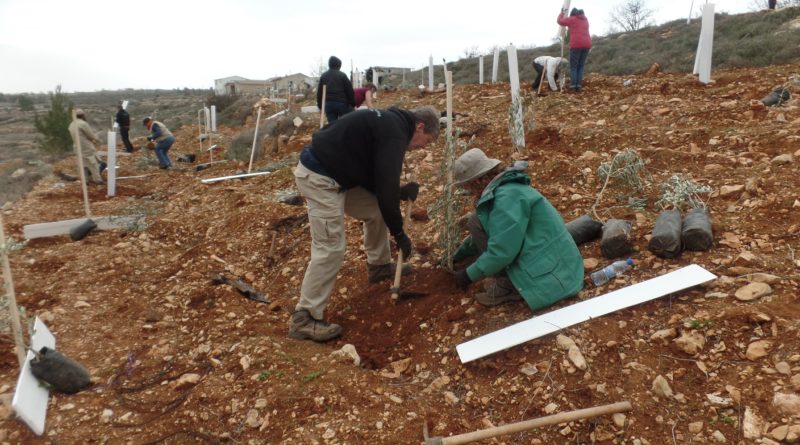Olive Tree Planting Diary by Pat Arner
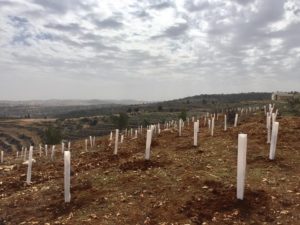 DAY 1: Palestinians love, respect, and need their Olive Trees. These ancient trees represent the Palestinians’ struggle to save their lands, homes, sources of income and their heritage. Many of their Olive Trees are being cut down and/or burned by Israel to make way for the influx of Zionist Settlers from around the world. We could see several Settlements from the field, and the sound of the constant pounding of the drills boring into the bedrock for a new Settlement was aggravating and a constant reminder of the Palestinians’ struggle. We also learned that planting is hard work! The ground is rocky and heavy with clay. The farmer had already marked his field exactly where he wanted the trees planted using wood stakes. We were to remove the stake, dig a hole to fit the root ball using a pick ax or a hoe, remove the plastic from the root ball, place the tree in the hole, pack down the dirt around it, pound the 5 ft. stake next to it for support, then gently pull down a white plastic sheathing over the stake and sapling (being careful not to injure any of its tender branches), in order to protect the tree from animals and wind. Whew! We planted 300 trees on our first day using teams of two. We were exhausted!
DAY 1: Palestinians love, respect, and need their Olive Trees. These ancient trees represent the Palestinians’ struggle to save their lands, homes, sources of income and their heritage. Many of their Olive Trees are being cut down and/or burned by Israel to make way for the influx of Zionist Settlers from around the world. We could see several Settlements from the field, and the sound of the constant pounding of the drills boring into the bedrock for a new Settlement was aggravating and a constant reminder of the Palestinians’ struggle. We also learned that planting is hard work! The ground is rocky and heavy with clay. The farmer had already marked his field exactly where he wanted the trees planted using wood stakes. We were to remove the stake, dig a hole to fit the root ball using a pick ax or a hoe, remove the plastic from the root ball, place the tree in the hole, pack down the dirt around it, pound the 5 ft. stake next to it for support, then gently pull down a white plastic sheathing over the stake and sapling (being careful not to injure any of its tender branches), in order to protect the tree from animals and wind. Whew! We planted 300 trees on our first day using teams of two. We were exhausted!
The next day we toured Old Jerusalem visiting places rarely seen by tourists, and then stopped at a Bedouin camp. It was very clear to us that Israeli Settlers and the Israeli Government are continuing to force Palestinians from their homes and land.
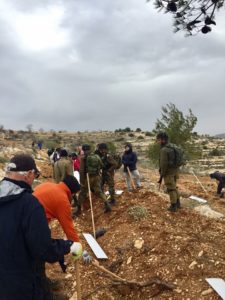 DAY 2: We were better organized today. However, after planting 300 of our 350 trees, the Israeli Military made us stop planting while they summoned the farmer and examined his papers. They eventually forced us to leave. They had been called by members of an Israeli “Outpost,” which is an emerging settlement built illegally on the farmer’s land, who complained to the Israeli military about our work. We later learned that during the night these illegal settlers tore up and stole all the trees we had planted. Every single one. We were devastated! Keep Hope Alive vowed to have that field replanted by other internationals.
DAY 2: We were better organized today. However, after planting 300 of our 350 trees, the Israeli Military made us stop planting while they summoned the farmer and examined his papers. They eventually forced us to leave. They had been called by members of an Israeli “Outpost,” which is an emerging settlement built illegally on the farmer’s land, who complained to the Israeli military about our work. We later learned that during the night these illegal settlers tore up and stole all the trees we had planted. Every single one. We were devastated! Keep Hope Alive vowed to have that field replanted by other internationals.
The following day we went to Bil’in, famous for its creative non-violent protests every Friday. Working through the Israeli court system, they won a verdict against Israel, forcing it to “Move the Wall” away from their village. Bil’in was able to gain back some of their land, but the cost was very high. Several people died and many were injured, including children. Though the Israeli military continues its use of rubber bullets and tear gas on the protestors, they persevere with their non-violent protest every Friday.
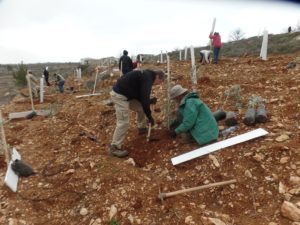 DAY 3: We’re getting better and faster! We planted 425 trees. My tree planting partner and I continue to pray for each tree as it is planted, while another team places a peace sign on each of theirs. The ancient Palestinian terraces we looked down upon are beautiful, but scarred by an Israeli Settlement.
DAY 3: We’re getting better and faster! We planted 425 trees. My tree planting partner and I continue to pray for each tree as it is planted, while another team places a peace sign on each of theirs. The ancient Palestinian terraces we looked down upon are beautiful, but scarred by an Israeli Settlement.
After planting on day 3 we visited Al Khalil (aka Hebron). This is a Palestinian town of 200,000 in a worsening and unjustified situation where 2,000 Israeli soldiers “defend” 500 militant Israeli Settlers who have forced themselves into the middle of this Palestinian town. Homes and shops along the main street have been bolted shut by the Israeli Military. The young radical Jewish Settlers strutting down the vacant and boarded street from their Shabbat were arrogant and armed with automatic weapons. It was a horrible thing to see 500 settlers holding this whole town hostage.
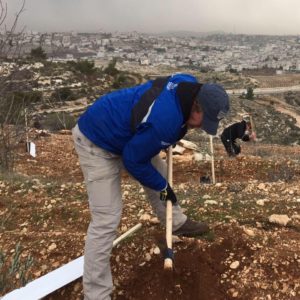 DAY 4: We worked well today and the field was planted with 400 trees even before the farmer’s family had lunch ready for us. We made a Peace Pole, using one of the planting stakes, and wrote on it, “May Peace Prevail on Earth.” Other internationals in our group eagerly wrote that phrase on the Peace Pole in their own languages, giving us a total of 13 different languages, including both Hebrew and Arabic. We originally planned to leave our pole in our last field of newly planted Olive Trees, but at the request of our beloved Keep Hope Alive director and co-worker, we gave it to him. He wanted to show others what Love and Justice look like. That last day we all found God’s Peace in the Field!
DAY 4: We worked well today and the field was planted with 400 trees even before the farmer’s family had lunch ready for us. We made a Peace Pole, using one of the planting stakes, and wrote on it, “May Peace Prevail on Earth.” Other internationals in our group eagerly wrote that phrase on the Peace Pole in their own languages, giving us a total of 13 different languages, including both Hebrew and Arabic. We originally planned to leave our pole in our last field of newly planted Olive Trees, but at the request of our beloved Keep Hope Alive director and co-worker, we gave it to him. He wanted to show others what Love and Justice look like. That last day we all found God’s Peace in the Field!
February 2017 KHA Report:
Almost 1500 trees planted – 300 stolen = Almost 1200 still standing!
Keeping Hope Alive, one tree at a time!
In February 2017, Rev. Dr. Jeff DeYoe, pastor of Covenant Presbyterian Church in Fort Myers, Florida, led a group on a Keep Hope Alive (KHA) trip to Israel/Palestine. The KHA trips are part of the East Jerusalem YMCA/YMVCA Joint Advocacy Initiative providing an international presence as solidarity and witness for the Palestinian olive harvest in the fall, and for olive tree planting in winter. This was Rev. DeYoe’s 5th trip to the region. The articles appearing this week are reports from the ground by “people in the pews” who went with him and stood as witness. Each traveler approached the trip from a different place in their faith and life journey. Through these posts edited by Noushin Framke, Ecclesio is pleased to take you to the olive groves in Palestine through their varied lenses.
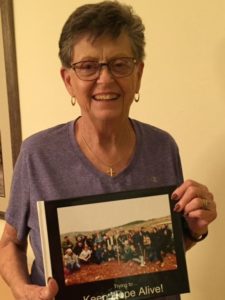 Pat Arner is a retired high school math teacher, with two daughters and 2 grandchildren who are all supportive of her travels to Palestine. She’s lived in Florida for 35 years and is a member of Covenant Presbyterian Church in Fort Myers.
Pat Arner is a retired high school math teacher, with two daughters and 2 grandchildren who are all supportive of her travels to Palestine. She’s lived in Florida for 35 years and is a member of Covenant Presbyterian Church in Fort Myers.

